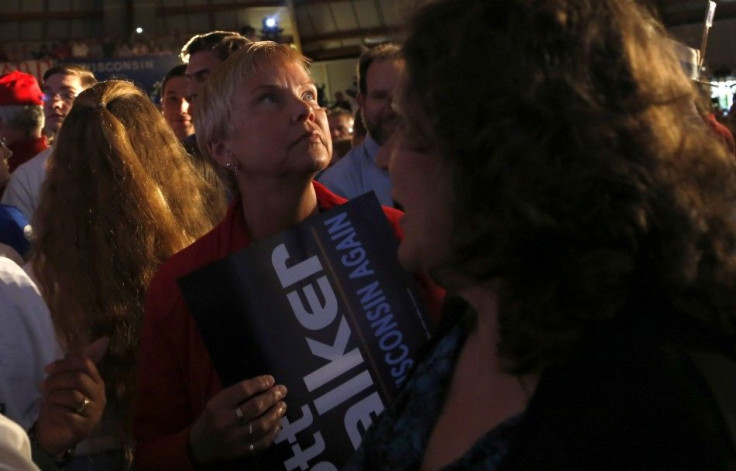Networks Call Walker Winner Of Wisconsin Recall Election

Wisconsin Gov. Scott Walker has defeated a recall attempt, the news networks declared an hour after the polls closed.
CNN, ABC, NBC, FOX all projected Walker the winner. With 35 percent of the precincts counted, Walker had 59 percent to Milwaukee Mayor Tom Barrett's 40 percent.
Voters came out en masse Tuesday to cast their ballots in the state's historic gubernatorial recall. The turnout was so heavy throughout the day that the city of Milwaukee was forced to bring in extra poll workers.
As the polls closed at 8 p.m. Central Time (9 p.m. Eastern), NBC reported exit polls had the race too close to call. CNN's exit polls said the same.
Although no statewide figures were available as of late Tuesday afternoon, local election officials told the Milwaukee Journal-Sentinel the turnout was as strong -- if not stronger -- than in the 2010 gubernatorial election. Some even compared it the 2008 presidential election, according to the newspaper, with local news sources reporting long lines at the polls in both Democratic and Republican-leaning communities.
In Madison, a liberal, anti-Walker stronghold, City Clerk Maribeth Witzel-Behl told TalkingPointsMemo.com that as of 4 p.m. Central Time, the city was at roughly 50 percent turnout -- and that if typical turnout patterns were to pan out, in which turnout doubles after the workday, the city could reach 100 percent turnout.
Witzel-Behl also said turnout has not been slowing down despite an early rush. There's a lot of people who decided to vote at the polls first thing in the morning. But we do have some polling places that called us not too long ago asking, 'Can you send us more poll workers? We're swamped.'
Local radio reported that parts of Madison recorded turnout of 119 percent of previously registered voters by 4 p.m., with four hours still to go. The extraordinary figure was attributed to a late surge in registrations by union and grassroots activists, taking the voter roll far above its previous levels.
The Milwaukee Journal Sentinel reported that officials in the Republican stronghold of Waukesha County are similarly predicting turnout there will exceed the predicted statewide average of 60 to 65 percent. Officials in neighboring Washington County, also a major GOP center, are similarly reporting heavy turnout.
In Appleton, officials told The Guardian the town could match or even exceed the 2008 presidential election turnout, a trend reported elsewhere.
State officials report relatively few problems, despite the enormous turnout. The federal Department of Justice sent a team of 17 lawyers and agents across the state to monitor the election results, according to a report from the Wisconsin State Journal. As of 3 p.m. Tuesday, a DOJ spokesman told the newspaper there had been no major voting fraud issues.
Government Accountability spokesman Reid Magney told the newspaper there were no confirmation of any districts running out of ballots.
State election officials have predicted that 60 to 65 percent of the state's registered voters -- or 2.6 million to 2.8 million people -- would cast a ballot in the highly polarizing recall.
Early exit poll data from ABC News suggests a tight contest. Voters were reportedly almost evenly divided in their opinion of Walker's handling of unions, a controversy that essentially launched the recall effort after the state stripped public sector workers of most of their collective bargaining rights.
Exit polls reported by the Washington Post found that in race, ideology, religion and Tea Party support, the composition of Tuesday's electorate closely resembles that of 2010, when Walker defeated Barrett. But in a possible danger sign for Walker, union households comprised roughly one-third of all voters in the recall - a figure that, if it holds, would be higher than in any election in the Badger State in the past eight years.
In addition to Walker, five other Republican state officials are facing a recall vote: Lt. Gov. Rebecca Kleefish, and state Sens. Scott Fitzgerald, Van Wanggaard and Terry Moulton. While Sen. Pam Galloway also faced a recall vote, she resigned from her post in March. If the Democrats take even one of the seats, they regain the chamber.
Some Wisconsin voters have taken to Twitter, Facebook and online message boards to report anonymous robocalls from individuals telling them that if they signed petitions to recall Walker, their vote in Tuesday's crucial recall has already been counted. On Monday night, Barrett told MSBC host Ed Schultz that his campaign began receiving complaints about the calls on Monday.
On Tuesday the League of Women Voters of Wisconsin reported they had received more than 100 calls by 2 p.m. from college students who said they were having difficulty casting their ballots. Carolyn Castore, who is coordinating the organization with the Election Protection initiative, told the Wisconsin State Journal that students have been hassled about proof of residency as well as over confusion about the state's relatively new voter ID law, which requires individuals to establish residency at a given address for 28 days in order to be able to vote from that location.
Under the law, students who voted from their college residence in the May 9 recall primary must vote at the same location for Tuesday's election. Some students have reported they have been told they cannot register to vote using their home or summer address, even if they did not vote while away at school.
© Copyright IBTimes 2025. All rights reserved.




















